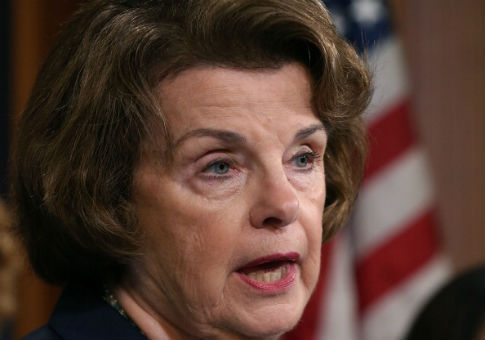Democratic Sen. Dianne Feinstein, who is facing a serious primary challenge in California, has jettisoned a long-held political stance that had put her at odds with the increasingly left-leaning electorate in her state.
Feinstein, who chairs the Senate Caucus on International Narcotics Control along with Sen. Chuck Grassley (R., Iowa), announced in an interview with McClatchy she was abandoning her opposition to legalizing recreational cannabis.
The declaration, which reversed over three decades of public statements, votes, and political posturing, was conducted with little fanfare. Discussing the recent standoff between the Justice Department and the states, Feinstein said federal law enforcement agencies should refrain from cracking down on individuals who were complying with local laws governing cannabis.
"Federal law enforcement agents should not arrest Californians who are adhering to California law," Feinstein said.
Feinstein struck a cautious note on the drug's future, arguing stronger regulations were needed to ensure public safety was not endangered. Along those lines, the senator expressed support for limiting the drug's accessibility to underage individuals and for tightening laws to prevent cannabis users from driving under the influence.
"My state has legalized marijuana for personal use, and as California continues to implement this law, we need to ensure we have strong safety rules to prevent impaired driving and youth access, similar to other public health issues like alcohol," Feinstein said.
In 2016, California voters overwhelmingly passed a ballot initiative that legalized the cultivation and use of cannabis for recreational purposes. Feinstein opposed the initiative, which passed by nearly two million votes, claiming it lacked adequate public safety protections.
The senator's opposition to the successful initiative was only the most recent; she's continuously chaired statewide efforts to defeat legalization since entering the Senate. Feinstein has previously stated her views on cannabis were forged during the 1960s while serving on the California Women's Board of Terms and Parole, where she witnessed numerous convicts who "began with marijuana and went on to hard drugs."
The senator's staff elaborated Tuesday that Feinstein's views had evolved after coming into contact with individuals, particularly young children, who benefited from medicinal marijuana.
Feinstein's sudden change on the issue comes despite the fact medical cannabis has been legal according to the state of California for over 21 years.
California has allowed the medicinal use of cannabis since Prop 215, a ballot initiative to allow patients and caregivers the ability to grow or possess marijuana if it was recommended by a doctor for treatment, was passed in 1996.
At the time, Feinstein, teaming up with California's law enforcement groups, led the opposition to Prop 215, arguing it was poorly written and would serve as a trojan horse for legalization efforts. Furthermore, while the ballot initiative passed by over a million votes, the senator maintained her vocal resistance to medical marijuana for decades.
It is unclear how recently Feinstein's views evolved as the 84-year-old senator failed to sign on to a letter sent by Sen. Elizabeth Warren (D., Mass.) and Rep. Jared Polic (D., Colo.) in January urging the Trump administration to restore Obama-era guidelines that allowed states to determine their own cannabis laws.
The reversal does, however, narrow the list of issues separating Feinstein and her main primary challenger, former California State Senate president pro tempore Kevin de León. Although de León has not made marijuana legalization a top priority of his campaign, he has supported state legislation to reform prohibitions on the drug in the past.
California's progressive activists have cited Feinstein's stance on the drug, along with her supposed timidity in responding to President Donald Trump and refusal to support sing-payer healthcare, as proof she is out of touch with the majority of California voters.
